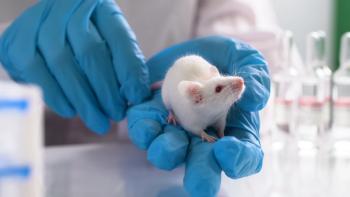
The lost art of the physical exam
Many veterinarians fail to perform full physical exams, instead jumping into quick diagnostics.
Imagine a client brings in a young French bulldog who, for no apparent reason, vomits a yellow bile one or two nights a week. The dog is bouncing all over the room, ready to play, and he doesn't tense up when you touch his belly. So what do you do? If "radiograph" is the first word that pops into your head, you may be contributing to one of the biggest problems I see developing in veterinary medicine.
Jeff Werber, DVM (PHOTO COURTESY OF DR. JEFF WERBER)
Technology has allowed veterinarians to perform more in-depth examinations and safer, more accurate medical procedures. But the advantages come at a price. When we rely on our tools and instruments to make our diagnoses rather than confirm them, we're failing to provide the level of care our patients deserve. A lot of veterinarians are becoming glorified technicians, using technology as a shortcut and losing sight of their professional duties.
Times are changing
In the case of the French bulldog, an experienced doctor would ask questions to document the dog's history and perform a full physical exam. When is he vomiting? How is his appetite? Does his stool look normal? These questions aren't just standard procedure—they could provide important answers to the cause of the problem, or a possible solution. Maybe he just needs an antacid or a diet change.
Don't get me wrong; I use radiography and ultrasound machines on a daily basis. But before I do, I know what I'm looking for. The machines are a way for me to confirm that my hunch was correct. Too many doctors nowadays are using technology to formulate their hunches.
I see this reliance on machines most in younger doctors. When I attended veterinary school in the early 1980s, ultrasound machines took up half an exam room. Now they're small enough to fit on a cart and can deliver high-quality images in a matter of seconds. As a result, many doctors are losing their innate ability to systematically diagnose their patients in a logical and cost-effective way. They're abandoning the principles they worked so hard to learn in veterinary school. I'd like to see them hone their basic skills rather than jump immediately into advanced diagnostics.
Turn back the clock
I know it may seem more efficient to send a patient in for a quick test than to study the pet's history, perform a thorough physical exam, develop a systematic diagnostic plan, and, based on these results, create an informed treatment plan. But along with giving our patients short shrift, this course of action diminishes the bond we develop with clients and pets. Performing a full, hands-on examination ingrains us in the lives of our patients and strengthens our relationship with our clients. In an automated, battery-powered world, it's important to make that emotional connection with animal and human alike.
Also, in today's economy, it's important to ask yourself, "How do I want to make money?" Sure, you can generate more revenue by jumping into a barrage of tests, but you have to be able to justify that these tests are necessary—think about the single mother trying to scrape money together for her child's education. At the end of the day, you'll keep more clients by making sure they're satisfied—and not spending outside their means. Don't lose sight of the big picture.
I'd love to see more doctors practice like we did 20 years ago, before we had all of these tests and machines. Let's go back to the basics we learned in veterinary school. Let's perform thorough physical exams using our senses—sight, smell, touch, hearing—to make initial diagnoses. If plan A doesn't work, let's go to plan B, or plan C until we find the problem and the best way to treat it. Let's go back to doing things the right way.
Veterinary Economics Editorial Advisory Board member Dr. Jeff Werber owns Century Veterinary Group in Los Angeles. To share your comments, e-mail us at
Newsletter
From exam room tips to practice management insights, get trusted veterinary news delivered straight to your inbox—subscribe to dvm360.





